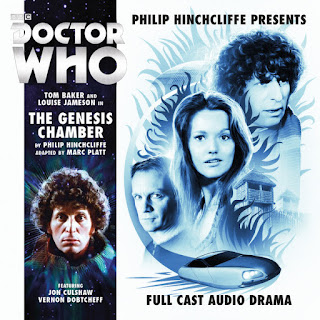Aldous Huxley wrote a
novel about the dangers of eugenics in a science fiction dystopian novel, Brave New World, and is regarded as a
piece of classic British science fiction. Philip Hinchcliffe was influenced
slightly by these ideas when crafting the ideas he would use in The Genesis Chamber. Letting Philip Hinchcliffe continue with audio
drama writing after the success of The
Ghosts of Gralstead and The Devil’s
Armada was a given for Big Finish, but if I’m going to be honest, this
story is tied with The Devil’s Armada,
for the weakest of the Philip Hinchcliffe Presents stories. The story is by no means a bad story, it’s
just that there are flaws with it that are more apparent when listened to after
the treat that was The Ghosts of
Gralstead.
Hinchcliffe and Platt
again bring us a story with a plot that is very strong, but unlike the other
two stories in the range, this one is much simpler than the others. There is a planet where most of a society has
gone under the tyrannical rule of a president and have secluded themselves in
an enormous city covered in a dome.
There is a flaw when it comes to Platt and Hinchcliffe trying to put in
some message about how xenophobia is wrong, but that’s a bit muddled when the
only actual alien that everyone trusts is in a shocking twist is the villain
and is trying to take over the world, kill everyone, and other evil
things. The message could be the
opposite that xenophobia in small doses can be a good thing, but even that one
is muddled as the first message comes through one half of the time. It could be going for nobody really wins
situation, but we have a pretty happy ending when everyone goes outside and
lives in harmony, afraid of other alien invasions. The plot also introduces a lot of good ideas
when it comes to the eugenics and an interesting take on the morally grey
aspects of genetic engineering of children and in vitro fertilization, but
these ideas are barely explored with the story ending with the implication that
it’s just wrong. The story should have
gone into the debate more before creating that position for itself. The plot is pretty standard for the era as a
mix of The Face of Evil, with a
supercomputer going haywire, and your standard alien invasion from an alien
that seems benign until it’s too late.
There are subplots involving love in the air and actually wants to be an
exit story for Leela which would have been much more suitable than The Invasion of Time.
Yes this story has
characters who fall in love, even if they are doomed to fail. While Leela would eventually get hitched with
the bland Time Lord Andred, in this audio Hinchcliffe and Platt give her a
believable love interest in Dack, played wonderfully by Ben Jackson
impersonator Elliot Chapman, while his brother Shown played by Arthur Hughes
gets a love interest in Princess Ana Janze, played by Hannah Genesius. Both relationships could be described as
star-crossed affairs from the start of the story, but at least one of them ends
up together perfectly, but it cannot be Leela.
Louise Jameson has a real chance to show her range as Leela in this
story as she has to be a mentor to her flame, as he isn’t used to
fighting. Her rage at his death in the
middle of the story is extremely believable.
The other love affair is more complex as you have intentional parallels
to Romeo and Juliet, and a love story
filled with political drama and intrigue.
It turns out that Ana’s grandfather, played by veteran Doctor Who actor
Vernon Dobtcheff, knows much more than he’s letting on while her father, the
President played by Jon Culshaw is already planning an arranged marriage for
his daughter.
Tom Baker as the Doctor
much like the performance in The Devil’s
Armada is on top form here as he has the upmost respect for Philip
Hinchcliffe. Baker makes sure he is able
to verbally spar with his opponent Volor and has is even charismatic towards
Leela. Really it is Baker who makes you
want to keep listening to the audio, but they really missed a trick when they
didn’t have Baker and Culshaw go at it as that would be very interesting to
see. The Doctor also has an interesting
stance on Inscape, the supercomputer of this story, which is another example of
how good the production is when it makes you feel for a dead computer that was
never alive in the first place.
To summarize, The Genesis Chamber is overall a great
story that’s biggest flaws come from confusing messages it’s trying to give as
well as just dragging on. The good ideas
aren’t explored enough, but the actual story and acting performances from the
entire cast make up for that tenfold.
Everyone is on top form making the hefty price tag on this release well
worth it. 80/100.

No comments:
Post a Comment